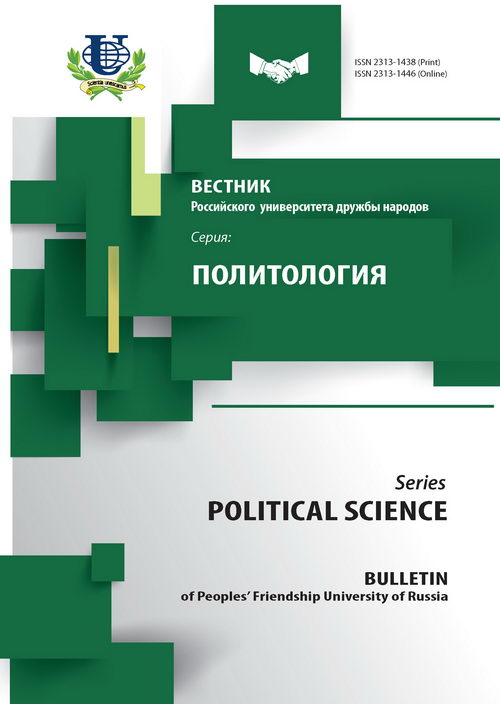Сниженная лексика в речах Президента РФ Д.А. Медведева как инструмент его имиджевой стратегии
- Авторы: Смирнова И.С.1, Ковалевская Е.В.1
-
Учреждения:
- Санкт-Петербургский государственный университет
- Выпуск: № 3 (2011)
- Страницы: 64-70
- Раздел: СТАТЬИ
- URL: https://journals.rudn.ru/political-science/article/view/9185
- ID: 9185
- Дата ретрагирования: 19.10.2022
- Причина ретрагирования:
в связи с полным текстуальным совпадением с ранее опубликованной статьей Смирнова, И. С. Сниженная лексика в речах Президента Российской Федерации Д.А. Медведева как инструмент его имиджевой стратегии / И. С. Смирнова, Е. В. Ковалевская // Вестник Военного университета. – 2011. – № 2(26). – С. 94-99
Цитировать
Полный текст

Аннотация
Об авторах
Ирина Сергеевна Смирнова
Санкт-Петербургский государственный университет
Email: dririnasmirnova@mail.ru <mailto:dririnasmirnova@mail.ru>
Кафедра теории и истории международных отношений; Санкт-Петербургский государственный университет
Евгения Владимировна Ковалевская
Санкт-Петербургский государственный университет
Email: janchik7@yahoo.com <mailto:janchik7@yahoo.com>
Кафедра теории и истории международных отношений; Санкт-Петербургский государственный университет
Список литературы
- Заявления для прессы и ответы на вопросы журналистов по итогам переговоров с Президентом Франции Николя Саркози // Президент России: официальный сайт. URL: <http://news.kremlin.ru/transcripts/1072>
- Встреча с Президентом Молдавии В.Н. Ворониным // Президент России: официальный сайт. URL: <http://news.kremlin.ru/news/1204%2023.11.2010>
- Интервью Дмитрия Медведева телеканалам «Россия», Первому, НТВ // Президент России: официальный сайт. URL: http://news.kremlin.ru/transcripts/1275
- Интервью ведущим российским телеканалам // Президент России: официальный сайт. URL: <http://news.kremlin.ru/transcripts/2602>
- Ответы на вопросы Российских журналистов в Африке // Президент России: официальный сайт. URL:<http://news.kremlin.ru/transcripts/4781>
- Итоги года с Президентом // Президент России: официальный сайт. URL: <http://news.kremlin.ru/news/6450%2023.11.2010>.
- Начало рабочей встречи с министром образования А. Фурсенко // Президент России: официальный сайт. URL: <http://news.kremlin.ru/transcripts/3482>
- Заключительное слово на совещании по вопросам социально-экономического развития Сибирского федерального округа // Президент России: официальный сайт. URL: http://kremlin.ru/ transcripts/5274 <http://kremlin.ru/transcripts/5274>
- Начало совещания о комплексных мерах по обеспечению стабильности в Северо-Кавказском федеральном округе // Президент России: официальный сайт. URL: http://kremlin.ru/ transcripts/9559 <http://kremlin.ru/transcripts/9559>
- Начало расширенного оперативного совещания с членами Совета Безопасности // Президент России: официальный сайт. URL: <http://news.kremlin.ru/transcripts/4384>
- Итоги года с Президентом // Президент России: официальный сайт. URL: http://news.kremlin.ru/ news/6450 <http://news.kremlin.ru/news/6450>
- Ответы на вопросы Российских журналистов в Африке // Президент России: официальный сайт. URL: http://news.kremlin.ru/transcripts/4781
- Встреча со студентами Киевского национального университета // Президент России: официальный сайт. URL: <http://kremlin.ru/news/7785%20>
- Интервью Дмитрия Медведева газете «Известия» // Президент России: официальный сайт. URL: <http://news.kremlin.ru/news/7659>
- Стенографический отчет о совещании в связи с терактом во Владикавказе 9 сентября 2010 года // Президент России: официальный сайт. URL: http://news.kremlin.ru/transcripts/ 8872
- Дмитрий Медведев выступил на Форуме европейских и азиатских медиа // Президент России: официальный сайт. URL: <http://news.kremlin.ru/news/6292>
Дополнительные файлы















